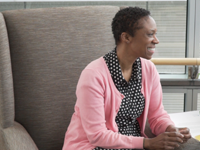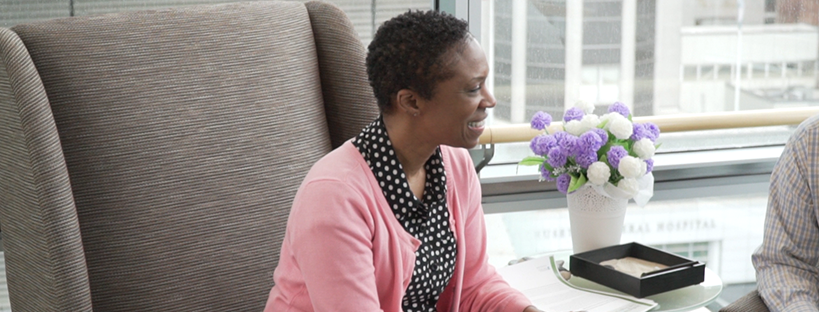“Just being able to help a patient, even making one appointment is where I get my satisfaction and joy,” Lead Patient Navigator Carmen Benjamin remarked.
The Massachusetts General Hospital Cancer Center navigation intervention is combining electronic health records and human touch to help patients receive the most comprehensive cancer care possible. The center is using TopCare (Technology for Optimizing Population Care in a Resource-limited Environment) software to match patient navigators with newly-diagnosed cancer patients who may require extra support. Navigation services at MGH are rooted in social work, with Lead Patient Navigator Carmen Benjamin and her team working to connect patients with transportation resources, financial services, and offering emotional support during appointments.
We last spoke to Carmen when we filmed the video Massachusetts General Hospital Cancer Center: Patient Navigation as the Cornerstone of Cancer Care. During her interview, she expressed great satisfaction helping cancer patients overcome barriers to care. Since most of Carmen’s patients are underserved, they often present with multiple illnesses to manage in addition to their cancer, and often lack social support: “Just being able to help a patient, even making one appointment is where I get my satisfaction and joy,” she remarked.
Now that some time has passed, she is eager to share important updates on the intervention, starting with the status of the patient featured in the Alliance video, David Cunha. David was first diagnosed with cancer in October of 2017. In the video, he explained that Carmen Benjamin assisted him and his wife Barbara from the very beginning, “making life a lot easier” every step of the way. Carmen reports that she spoke to the couple a few times after filming wrapped, and each time they were about to embark on a different vacation. In her view, they seemed to be doing well.
The cancer center has additional positive updates to share as well: the organization recently hired and trained two new patient navigators, Ausubel Pichardo and Aileen Navarrete. Both newcomers have a history of public service and commitment to helping others. Aileen volunteered in the community while studying at Harvard; Ausubel has traveled extensively on service trips, including to his native Dominican Republic with a group he founded at UMass Dartmouth. Carmen has been training the new arrivals, although she is quick to point out that patient navigation is an ever-evolving discipline, and “Learning experiences and opportunities are continuous.”
Ausubel speaks fluent Spanish and has been assigned to assist Spanish-speaking patients. This is an important benefit, as it streamlines the navigation process and it mitigates the need to rely on interpreters. Aileen has been similarly a wonderful addition to the team. In Carmen’s words, she “Personifies the patient navigation role by always seeking out best practices.” According to Carmen, Aileen has been very active in exploring different strategies to support cancer patients.

Pursuing best practice is an essential task for patient navigators as the position remains as emotionally demanding as ever. Although the odds are improving every day, not all cancer patients go into remission, and some lose their lives to the disease. This can be a difficult reality to face. Carmen revealed that, after an initial struggle, she has learned to accept it: “Not everyone we navigate will be cured of their cancer. I never thought I would be able to say this, but the death of a patient comes easier for me now than when I first started working as a navigator. I sit with death more easily now than I did back then.”
The majority of Carmen’s patients are from a disadvantaged socioeconomic background. As such, they are more likely to be diagnosed with aggressive forms of cancer, more likely to receive their diagnosis when the cancer is more advanced, and more likely to succumb to their cancer. This is why the work of patient navigators such as Carmen and her team is essential: they ensure patients receive appropriate care as soon as they need it. Carmen recommends her patients ask any question they may think of: “Do not be afraid, embarrassed, shy or think that you are wasting your providers’ time” she insists. She sees her patients as people first and strives to take all their needs into account: “One thing our patients should keep in mind is that their patient navigator understands that they are real people. Human beings. Much more than their diagnosis. They have goals and unrealized dreams that they want to fulfill. We are here to assist in any way we can to help navigate toward moving forward,” whatever that may look and feel like for them.
 Carmen Benjamin is a Lead Patient Navigator at the Massachusetts General Hospital Cancer Center. Prior to her work at Mass Gen, she was a practice liaison for the Boston Children’s Hospital, where she coordinated critical care appointments for patients from all over the world. Carmen Benjamin is a graduate of Walden University. She is currently pursuing an MSW with a specialized certificate in Health Care at the Simmons School of Social Work. She’s set to graduate in May.
Carmen Benjamin is a Lead Patient Navigator at the Massachusetts General Hospital Cancer Center. Prior to her work at Mass Gen, she was a practice liaison for the Boston Children’s Hospital, where she coordinated critical care appointments for patients from all over the world. Carmen Benjamin is a graduate of Walden University. She is currently pursuing an MSW with a specialized certificate in Health Care at the Simmons School of Social Work. She’s set to graduate in May.
